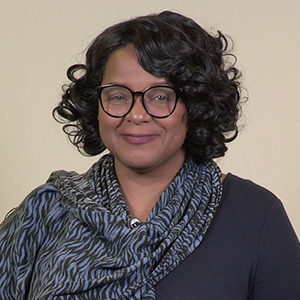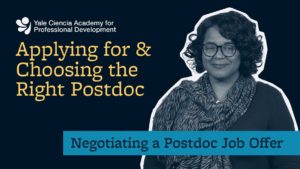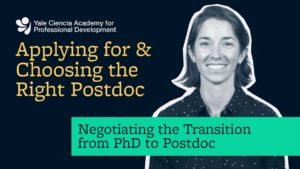Talk Overview
In this session, you will learn how to thoughtfully choose your next job opportunity and successfully negotiate with both your current research advisor and prospective one. You will learn how to strategically apply your negotiation skills as you navigate the process of securing a job offer; deciding which job opportunity is a good fit; and transitioning out of your PhD lab to begin a new chapter in your career. You will also learn how to execute each step with intention, clarity, and confidence.
Session Narrative
Transitioning out from your PhD is not always easy. Trying to close one door while opening another can feel like a balancing act. At this stage, you may find yourself standing in between two negotiations: one negotiation between you and your current research advisor as you prepare to leave, the other negotiation between you and your prospective employer, as you establish the parameters of your postdoc. You will need to manage the negotiation process with your research advisor. Applying your negotiation skills will help you create a feasible exit strategy by establishing your end date and clarifying your final responsibilities and expectations. Negotiating with potential employers requires an understanding of what’s negotiable, what you want to negotiate, and how to do so effectively. Once it’s time to make a decision, reflecting on and understanding how you’ve made decisions in the past will equip you with the knowledge and confidence to move forward. This way, you will be able to trust that your own decision-making process will guide you towards the job offer that’s right for you.
Negotiating the Job Offer
What should you do after you receive your first postdoc job offer? First, you should celebrate because all of your hard work has paid off! Next, you should negotiate. At this stage, you might be asking yourself a few questions. Should I even negotiate? What is negotiable? How do I negotiate? Preparing to negotiate can feel intimidating, but it doesn’t have to be. You can approach the process with confidence by (1) identifying which items are negotiable and (2) using negotiation strategies to present your ‘ask’ and communicate effectively.
Yes, you should negotiate. But, what is negotiable? To understand which factors are open for negotiation you can gather information from reliable references and seek career counselors at your institution. Your circle of support (e.g., peers and mentors) can also help you set and adjust your expectations for negotiating by sharing their personal experiences. Remember, every negotiation is affected by many factors (e.g., institution, funding mechanisms, etc.), so each experience may vary. However, there are three fundamental items that should always be addressed: your salary, start date, and preferred work schedule.
Once you know what you want, how do you ask for it? Using negotiation strategies like benchmarking and bundling will help you justify your ‘ask’ and communicate it effectively.
Benchmarking involves justifying your request by comparing it to an example from a similar position or job posting. Whether you’re seeking to increase the salary or extend the start date, you should be prepared to justify your proposal. For example, if you want to embed your insurance costs into your salary, you can benchmark your request by comparing your ‘ask’ to similar positions that put this into practice.
Bundling involves arranging your most important items together (i.e., top three ‘asks’) and presenting them as a cohesive “package.” This approach will make it easier to communicate your preferences and will give your potential employer an idea of the range and scope of your side of the negotiation. For example, you can begin the negotiation process by telling your prospective employer that you want to discuss your (1) start date, (2) salary, and (3) professional development opportunities. In this case, bundling your top 2-3 items establishes which factors you value the most and clearly frames your side of the negotiation.
Keep in mind that some factors are beyond your control. However, don’t be discouraged! Instead, seek out mentors from your circle of support that can provide emotional support, personal insights, and strategic ways to approach these issues.
Making a Decision
Once you finish with the negotiation process, it’s time to make a decision. But, how do you know which postdoc job offer is right for you? How can you factor your professional and personal needs into the decision? The best strategy is to rely on a decision-making process that aligns with your values and honors how you tend to make important decisions.
Reflect on How You Make Hard Decisions. Do you usually follow your gut or follow the data? Do you like to crowdsource or rely on feedback from a trusted mentor? The best way to understand how (and why) you make important decisions is to revisit the last important decision that you made. For example, reflect on how you chose your current research advisor. Did you focus on the facts (e.g., funding and lab size) or did you focus on how you felt about the position and the team (e.g., friendly and approachable)? Or was it a combination of both? The key takeaway is that one approach isn’t better than the other. The goal is to trust how you’ve made critical decisions in the past – and then do it again.
The Final Lap: Negotiating Your PhD Exit
Once you accept an offer, the next step is to discuss your PhD exit plan with your research advisor. It’s helpful to think of this stage as another negotiation, except this time you’re negotiating your departure from your current lab. What should your exit plan include? An effective exit strategy focuses on three main factors: departure date, productivity, and ownership.
First, you should choose your departure date and then you can work backwards from there. Consider which personal or professional circumstances you should factor into this decision. For example, your end date can affect your eligibility for postdoc training awards and fellowships. If you’re feeling stuck, seek advice from recent graduates and current postdocs to help you set a realistic end date. But, be careful with attaching your departure to the productivity goal of a project (e.g., publication submission) because the finish line might continue to move.
Once you decide your departure date, set your goals on what you would like to accomplish with the remaining time and what is realistic to do. You might find that you and your advisor have different expectations about your productivity and about what is feasible. If you don’t clarify these expectations from the beginning, it could create conflict and tension during the negotiation process. So try and avoid this by first defining what productivity means to you. What project(s) would you like to complete (and are feasible to complete) before your departure date? Do you need to train someone to take on a project(s) that you started? Part of the exit strategy is finding a balance between your productivity goals and the expectations of your advisor.
Now that you’ve decided when to leave and what you want to accomplish, you’ll need to set clear expectations with your advisor about what you are taking with you and what you’re getting credit for (i.e., ownership). Once you pull these three pieces together (i.e., departure date, productivity, and ownership) you’ll have a thoughtful and strategic exit plan to transition out of your PhD and onto the next stage (for additional information on how to prepare an exit plan as you leave your PhD, check out Module 1-Session 4: Prepare to Leave your PhD).
Activities (Exercises and Self-Reflection):
Questions:
- Activity 4.1: Preparing to Negotiate
- Activity 4.2: Making Hard Career Decisions
- Activity 4:3: Negotiating Your Exit Strategy
Answers:
- Activity 4.3 (Answers): Negotiating Your Exit Strategy
Speaker Bio
Rachel Care

Dr. Rachel Care is a Program Director at the Office of Career and Professional Development at the University of California, San Francisco. There, she aids the career and professional development needs of graduate students and postdoctoral scholars. She also leads postdocs through their transition into a faculty position. Rachel is passionate about supporting early-stage students…. Continue Reading
Naledi Saul

Naledi Saul is the Director of Career and Professional Development at the University of California, San Francisco (UCSF). She holds a Master’s of Public Management degree from the University of Maryland, College Park, and a Bachelor of Arts in History from Spelman College. Prior to UCSF, Naledi was an Assistant Dean of Students and Assistant… Continue Reading








Leave a Reply